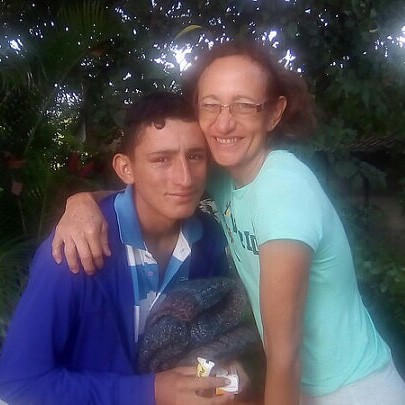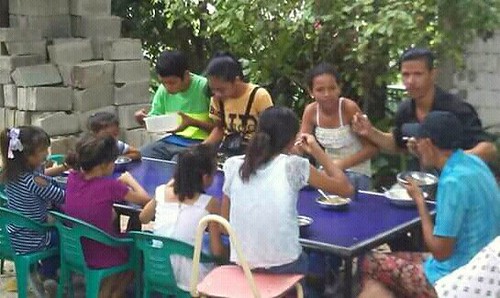 |
| Luz Maria bids farewell to her grandson, Pedro. |
Now, in a North American setting, one of the factors that may contribute to backdoor losses is people moving away to another city or state. But none of those discussions of 30 years ago dealt with the situation that our mission faces now. And not just our mission, but other congregations in the Lutheran Church of Venezuela and other church-bodies as well. This situation is the sudden, snowballing mass emigration of people from the country. Imagine people who have been active and enthusiastic members of your congregation suddenly deciding that they can’t take it anymore and moving themselves and their families abroad.
Here the border is almost in our backyard, if not at the back door. La Caramuca is a town of about 5,000 people just outside of Barinas, a city of several hundred thousand. Only two or three years ago, we could catch a bus into Barinas at a corner less than a block from the mission. Now we have to walk across La Caramuca to the highway to catch a bus. The highway is national Highway 5, which you can take from Barinas all the way to Valencia. Then at Valencia you can hop on the four-lane freeway to Caracas. It’s a journey of seven to eight hours by car or bus.
But rather more people these days are interested in traveling the opposite direction on Highway 5. From Barinas, it’s about four or five hours to San Cristobal, the last major city before you reach the Colombian border. Highway 5 long has been a pipeline for the smuggling drugs, firearms and other contraband to secret airstrips and ports on the Venezuelan coast.
I visited San Cristobal once when I fell asleep on the bus back from Caracas and did not wake up when it stopped in Barinas. That was in 2007, and even then, the U.S. State Department has a standing waring against U.S. citizens traveling that close to the border, because of all the fun and games with paramilitary groups/drug traffickers in the borderlands.
Just on the other side of the border is the city of Cúcuta, Colombia. Thousands cross the border every day at Cúchuta, often on foot. Venezuelans fill the streets of Cúcuta. From Cúcuta, they may be able to find overland passage to Ecuador or Peru (few can afford to fly out of Venezuela).
 |
| Sharing soup after Divine Service. |
Above all, we continue to offer a message of hope in the midst of a national crisis. Preaching, or public proclamation of the Gospel, must be by “whether in season or out of season”, according to the English Standard Version translation of 2 Timothy 4:2. Whether the current situation is an opportune time or not may be a matter of perspective. In the midst of great instability, people may be the most ready to receive the good news of the Lord’s continued presence, now and forever, in the lives of those who believe and have been baptized. Nevertheless, whether opportune or not, the public proclamation of the Gospel must continue. To combine Word and sacrament ministry with works of mercy and compassion has a long history among us.
We continue also to pray for the Venezuelans in exile; that they may find the better life they seek, but also may be fed with the Word and sacraments. Thanks be to God for Lutheran mission work in Ecuador and Peru.
No comments:
Post a Comment